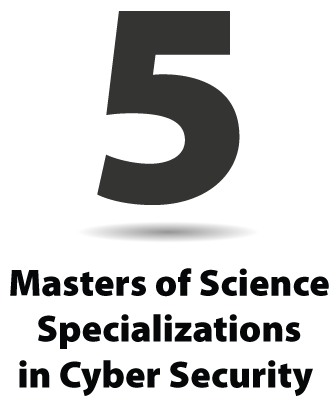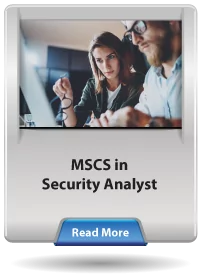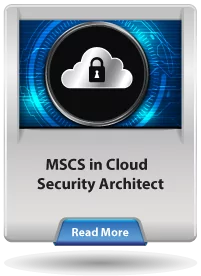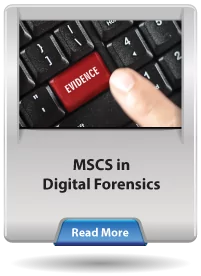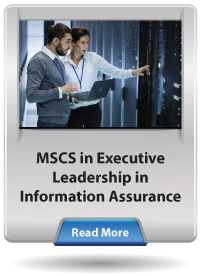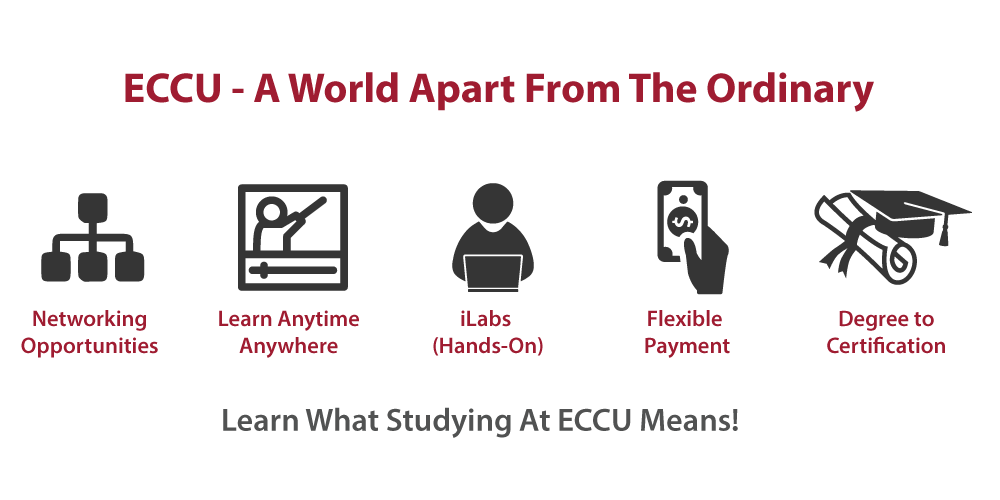100% Online Master’s Degree in Cyber Security.
Flexible. Accredited
Admission Inquiry
"*" indicates required fields
New Term Starts on
July 7, 2025
Online Master of Science in Cyber Security Degree Program
Overview
ECCU’s Master of Science in Cyber Security (MSCS) program prepares professionals to assume cybersecurity and information assurance leadership roles in corporations, agencies, and organizations. A curriculum rich in computer security management, IT security threat assessment, incident response, organizational management and behavior, and leadership challenges students to become creators of knowledge and inventors of processes.
ECCU’s online master’s in cybersecurity has been divided into a set of core courses that provide the necessary skills in cybersecurity, organizational behavior, and structure, research, and writing. The cyber security master’s degree online then offers various specializations to allow students to select specific fields of study that they are passionate about, each having well-defined job prospects, derived from the NICE framework, affiliated with them.
EC-Council University’s 100% Online cybersecurity master’s degree allows students to complete coursework in a timeframe that fits their schedule. This also requires that the student has the appropriate technology and connectivity to sustain constant participation in class activities.
Program Summary
LEVEL OF STUDY
Graduate
NUMBER OF COURSES
12 (36 Semester Credit Hours)
MODE OF STUDY
Online (Flexible with Hands-On Experience)
DURATION
2 Years – 10-week terms (4 per year)
TERM BEGINS ON
July 7, 2025

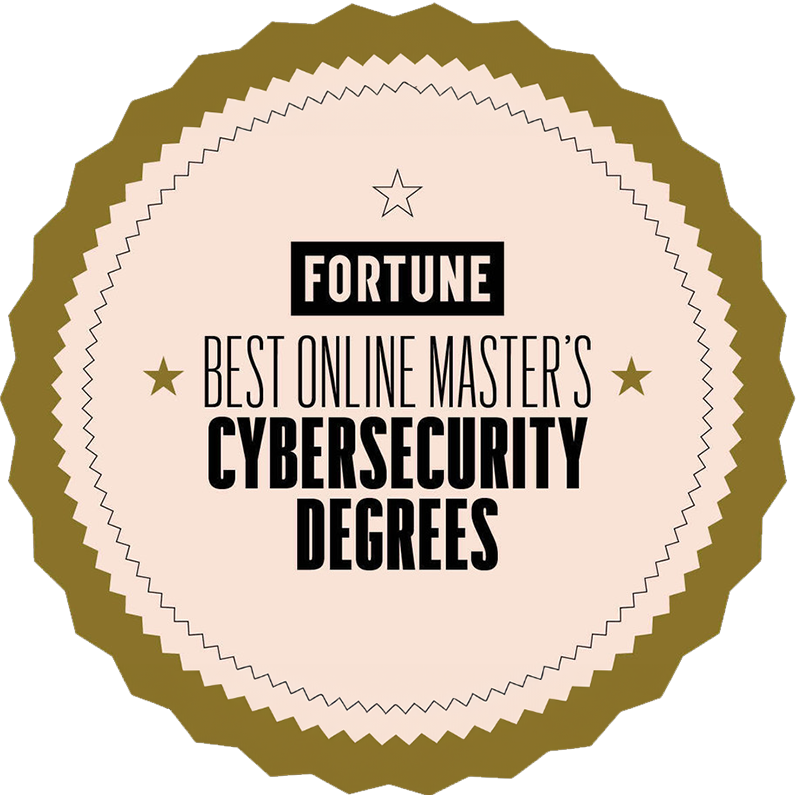
EC-Council University has been ranked among “The Top 10 Best Online Master’s in Cybersecurity” by Fortune®, underscoring our commitment to excellence, innovation, and ethical practices in cybersecurity education.
From Fortune. ©2024 Fortune Media IP Limited. All rights reserved. Used under license.
About Master of Science in Cyber Security
Developed from a learning model based on Bloom’s Taxonomy, the objectives of ECCU’s cyber security master’s degree program are to identify what students should learn, understand, and be able to do based on their EC-Council University coursework.
The university’s cyber security master’s degree programs are established with a mix of both business management and applied practical technology studies. This is based on the industry’s need to have a balance of applied skills and disciplines in both technical domains of research and practical business knowledge in the workplace. The purely technical theory or heavily managerial focus of some programs does not produce as well-rounded a cybersecurity expert as is generally desired by the industry.
What you will learn upon completion of a Master’s Degree in Cyber Security:
ECCU’s master’s in cyber security program will help you train in the following skills:- The application of technical strategies, tools, and techniques to secure data and information for a client or customer.
- Adherence to a high standard of ethical behavior.
- The use of research in both established venues and innovative applications to expand the body of knowledge in cybersecurity.
- The application of critical thinking to creatively and systematically solve the problems and meet the challenges of the ever-changing environments of cybersecurity.
- The mastery of the skills necessary to move into leadership roles in companies, agencies, divisions, and departments.
Course Structure
The course structure of ECCU’s master’s degree in cyber security is presented over 10-week terms and consists of assigned readings, threaded discussions, case studies, written analysis, research projects, and examinations.
Students of the master’s degree in cyber security must spend 10-12 hours of study a week to complete the work. ECCU encourages regular and frequent student-faculty interaction via the internet. The syllabus and grading rubrics of the cybersecurity master’s degree set out the course requirements, expectations, and timelines, and students are kept abreast of their progress in the course through the My ECCU Online Learning Management System.
Course Delivery of Masters in Cybersecurity
Coursework of Master’s in Cyber Security degree program is delivered through a 100% online, providing the flexibility of time management whereby students can attend to coursework at any time of day/night or weekends (24×7). There is a structure to the week and term whereby attendance and submissions must meet predefined deadlines each week and weekly attendance and participation are mandatory. Synchronous scheduled class times are not utilized, but adherence to discussion and homework weekly posting deadlines are.
ECCU’s cyber security master’s degree utilizes traditional university 10-week terms and is structured accordingly. The course delivery sits in a flexible middle ground between the structure of set class times and attendance and the open-ended system of self-paced independent study courses.
Each course under the master’s degree in cyber security program is instructor-led by credentialed professors with industry experience with a maximum enrollment of 30 students. Guided discussion, interaction/engagement, assistance/support, and grading/feedback will be done with your professor weekly as the course proceeds.
Courses in the masters in cyber security typically consist of a mixture of weekly threaded discussions, reading materials, iLabs (ECCU’s online virtual platform to practice), presentation support (PowerPoint and/or video), quizzes/exams, and/or research projects/papers.
Candidates who wish to pursue ECCU’s master’s in cyber security online degree can choose one of its five specializations – Security Analyst, Cloud Security Architect, Digital Forensics, Incident Management, and Business Continuity and Executive Leadership in Information Assurance
Master’s Degree in CyberSecurity: Program Outline
- ECCU 505 – Introduction to Research and Writing
- MGMT 502 – Business Essentials
- ECCU 504 – Foundations of Organizational Behavior
- ECCU 516 – The Hacker Mind: Profiling the IT Criminal
- ECCU 514 – Leadership and Management in Organizations
- ECCU 500 – Managing Secure Network Systems
- ECCU 507 – Linux Networking and Security
- ECCU 501 – Ethical Hacking and Countermeasures
- ECCU 503 – Security Analysis and Vulnerability Assessment
- ECCU 506 – Conducting Penetration and Security Tests
- ECCU 509 – Securing Wireless Networks
- ECCU 519 – Capstone
- ECCU 520 – Advanced Network Defense
- ECCU 525 – Securing Cloud Platforms
- ECCU 510 – Secure Programming
- ECCU 502 – Investigating Network Intrusions and Computer Forensics
- ECCU 521 – Managing Risk in Information Systems
- ECCU 517 – Auditing IT Infrastructures for Compliance
- ECCU 522 – Incident Handling and Response
- ECCU 513 – Disaster Recovery
- ECCU 512 – Beyond Business Continuity
- ECCU 511 – Global Business Leadership
- ECCU 523 – Executive Information Security Management/ Executive Governance and Management
- ECCU 515 – Project Management in IT Security
Virtual Labs
100% Virtualization for a Complete Learning Experience!
iLabs was built for you. Whether you’re a beginner or an expert, iLabs is entirely customizable to your needs. No experience necessary!
Practical hands-on learning provides access to real-world tools and scenarios, boosts knowledge retention, and is proven to be more effective at preparing you for the job!
Admission Requirements for MS Cybersecurity
Applicants for admission must have a Bachelor’s degree from an accredited institution and a TOEFL score of 550 or better (or proof of English competency).
For more information about admission requirements, please visit our Admission page.
- Student Enrollment Application.
- Official government ID or passport (international students).
- A photo of yourself holding your official government ID.
- Official transcript(s) from the institution where the student received bachelor’s degree or most recent master’s degree.
- An official evaluation of international credits (for students with international transcripts only).
- Proof of English proficiency (international students only; see the section on English Requirement for International Students).
- Application fee.
Graduation Requirements
EC-Council University will award the Master of Science in Cybersecurity degree upon successful completion of all degree requirements.
In addition to the specific degree requirements, each candidate for graduation must meet the following requirements:
- Completion of thirty-six (36) semester credits of 500 level courses in which the candidate earned a cumulative GPA of 3.0 or better.
- Satisfactory completion of the summative capstone course.
- All degree requirements must be completed within one and a half times the program length or have a cumulative course completion rate of 67% of coursework from the date the student enrolls in the university and begins the MS in Information Security program
Industry Certifications Included in the Cybersecurity Master's Degree Programs!
ECCU understands the modern students need to be industry-ready. Hence, all of EC Council’s relevant industry certifications have been included in the various specialisations. Earn up to 3 industry certifications for any specialisation selected.
Certifications
Master’ Degree
Courses
ECCU
Student Price

- ECCU 500
Managing Secure Network Systems
- Inclusive

- ECCU 501
Ethical Hacking and Countermeasures
- Inclusive

- ECCU 502
Investigating Network Intrusions and Computer Forensics
- Inclusive

- ECCU 506
Conducting Penetration and Security Tests - ECCU 503
Security Analyst and Vulnerability Assessment
- Inclusive
Exam Fee: $799

- ECCU 513
Disaster Recovery
- Inclusive
- ECCU 522
Incident Handling and Response
- Inclusive

- ECCU 523
Executive Governance and Management*
- Inclusive

- ECCU 523
Executive Governance and Management*
- Exam Fee: $999
Pricing: Master of Science in Cyber Security
TUITION FEES
Per Course Fee:
Number of Courses:
$1620
12
$19,440
- Books & Instructional Material
- Grammarly, a tool to Write Proficiently
- Weekly Live Online Classes
- Upto 4 Certification Exam Vouchers
Application Fee:
Technology Fee:
Lab Fee:
Graduation Fee:
Transcript Fee:
Transcript w/Apostille:
$65
$50 per term
$50/certification course
$400 (One Time)
$15+ shipping**
$35+ shipping**
**Students must have all financial obligations met prior to transcripts being released.
ECCU reserves the right to withhold transcripts and other similar documents when students, for example, have unmet obligations to ECCU.
The ECCU Governing Board has defined the regions. Student tuition rates are based on their official government photo ID that was submitted with the student admission application to determine the student’s region.
Transfer of Credits
As a prospective EC-Council University student and current industry-recognized certification holder, you can also earn semester credits toward your cybersecurity courses based on your prior learning/industry certifications.
Under the prior learning portfolio policy, ECCU for its cybersecurity master’s degree accepts certifications related to ethical hacking, penetration testing, network defense, digital forensics, incident handling, and much more.
Click here to read more about the EC-Council University Transfer of Credits program.
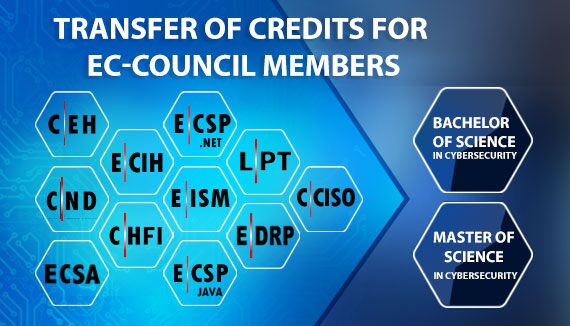
Apply For A Scholarship
Education is a major foundation of a person’s professional and personal growth. At EC-Council University, we not only recognize and accept many external scholarships but also have many scholarship opportunities available at EC-Council University for Master of Science in Cyber Security students.

Cybersecurity Hero’s Scholarship
ECCU is also dedicated to equipping our veteran community to become warriors in the battle for cybersecurity.

Cyber Challenge
A unique challenge to create awareness and opportunities for enthusiasts in the industry.

The Cybersecurity Dean's Scholarship
A unique scholarship opportunity to provide tuition assistance to new or current undergraduate and graduate students.

New Mexico Cybersecurity Scholarship
An amazing scholarship opportunity for new or current undergraduate and graduate students, specifically from New Mexico.
ECCU’s Online Cybersecurity Masters Degree Specializations
Read More »
Read More »
Read More »
Read More »
Read More »
Cybersecurity Master’s Degree Program FAQs
Ans. A master’s in cybersecurity degree paves the way for a candidate to enter the industry as a professional and secure an executive-level position. EC-Council University’s Master of Science in Cyber Security degree has been designed to train candidates and transform them into professionals to assume leadership roles in corporations, agencies, and organizations. Job roles that one can aim for with a cybersecurity master’s degree – Risk/Vulnerability Analyst/Manager, Information Security Analyst, Information Security Manager/Specialist, Chief Information Security Officer, among others.
Also read – What to do after you get a Master’s in Cyber Security?
Ans. Cybersecurity is amongst the most in-demand professions across the globe in 2020. A cybersecurity specialist has the responsibility of safeguarding a massive amount of private and sensitive data. Therefore, employees are willing to offer a hefty amount to candidates with the right skill set. According to PayScale, the average salary of a penetration tester in the United States is $83,968. Similarly, the average salary of a Software Security Engineer is $109,990.
Also read – Top 5 Cybersecurity Jobs of 2020
Ans. ECCU offers five specializations under its online master’s in cybersecurity program. Aspirants who wish to pursue this degree can choose one from – MSCS in Security Analyst, MSCS in Cloud Security Architect, MSCS in Digital Forensics, MSCS in Incident Management, and Business Continuity and MSCS in Executive Leadership in Information Assurance.
Ans. Cybersecurity is a continually growing industry. The rise in technological advancement and the parallel increase in the number of cyberattacks has made the need for cybersecurity specialists more vital. Getting an MS in cybersecurity can be worth it for candidates because of the growing demand for such professionals. With a master’s in cybersecurity online degree, candidates can fulfill the requirements of employers with the right skill set.
Also read – All about a master’s degree in cybersecurity
Ans. You should definitely go for a master’s in cyber security degree if you aim to rise high in your cyber security career pertaining to either of these five specializations: Security Analyst, Cloud Security Architect, Digital Forensics, Management and Business Continuity, Executive Leadership in Information Assurance. Following are some of the narrower job roles that these specializations will lead you to:
- Information Security Manager/Specialist
- Information Security Auditor
- Risk/Vulnerability Analyst/Manager
- Information Security Analyst
- Penetration Tester
- Security Architect
- Computer Network Defender
- Cyber security Defense Analyst
- Information Security (IS) Director
- Information Assurance (IA) Program Manager
- IT Project Manager
- Application Security Engineer/Manager
- Enterprise Architect
- Security Architect
- Research & Development Specialist
Ans. Aspiring students who have met the following conditions are eligible to apply for the master’s degree in cyber security:
- Have earned their bachelor’s degree or foreign equivalent from an appropriately accredited institution that is listed in the International Handbook of Universities, accredited by an agency recognized by the US Secretary of Education, and/or the Council for Higher Education Accreditation (CHEA).
- Have a Proof of English proficiency (international Students only; see the section on English Requirement for International Students here https://www.eccu.edu/student-services/admission/)
Ans. The master’s in cyber security program at EC-Council University comes packaged with a string of industry-recognized certifications: Certified Network Defender (CND), Certified Ethical Hacker (CEH), Certified Hacking Forensic Investigator (CHFI), Certified Penetration Testing Professional (CPENT), Certified Chief Information Security Officer (CCISO), EC-Council Disaster Recovery Professional, EC-Council Certified Incident Handler (ECIH), EC-Council Information Security Manager (EISM). The master’s degree, of course, has a broader coverage of topics and offers a deeper insight into the specialized areas. Aspirants may earn up to 4 industry certifications for any specialization selected.
Ans. The master’s degree in Cyber Security is a 100% online program. It spans 2 years and is divided into “10-week terms” and 36 Semester credit hours.
Ans. Upon the successful completion of the master’s degree in Cyber Security, you will be able to master the skills necessary to move into leadership roles in companies, agencies, divisions, and departments. It will lead you to multitude of career opportunities including:
- Information Security Auditor
- information Security Manager/Specialist
- Risk/Vulnerability Analyst/Manager
- Information Security Analyst
- Penetration Tester
- Security Architect
- Computer Network Defender
- Cyber security Defense Analyst
- Information Security (IS) Director
- Information Assurance (IA) Program Manager
- IT Project Manager
- Application Security Engineer/Manager
- Enterprise Architect
- Security Architect
Ans. Students are evaluated by their participation in discussion threads, assignments, lab assessments and reports, final examinations, papers, course final projects, and the capstone course.
Ans. Prospective students wishing to attend EC-Council University (ECCU) shall submit a complete application package including:
- a list of all prior institutions attended with the application fee.
- a signed copy of a Student Enrollment Agreement (SEA).
- official transcripts for evaluation of transfer credits.
- a copy of your unofficial transcripts may be submitted for provisional admission.
- an official copy of transcripts must be submitted for full admission.
(Refer to our catalogue for more details: https://edm-image.s3.us-west-2.amazonaws.com/ECCU/catalog/EC-Council-University-catalog.pdf)
Ans. You will get a postmarked, phoned, or emailed notification issued by the ECCU administration regarding admission statuses of prospective students.
Ans. System of education in terms of format:
- All courses are offered in 10-week term using an online format via the myECCU portal.
- To be considered a full-time student, a graduate student must take two courses in each term, and undergraduate students must take three courses per term.
- Students opting for fewer courses a term will be considered part-time.
- All degree requirements must be completed within one and a half times the program length as measured by course completion rate of 67% of course work from the first term the student enrolls in the University and begins the program to graduation.
System of education in terms of grading:
- All credits awarded by EC-Council University are semester hour credits.
- Credits are awarded only upon successful completion of a course or project requirements.
- Students will graduate with honors if they have a cumulative GPA of:
- Cum Laude – for grade point averages of 3.75 through 3.84
- Magna Cum Laude – for grade point averages of 3.85 through 3.94
- Summa Cum Laude – for grade point averages of 3.95 and above
Ans. For the master’s degree program the fee structure is:
- Tuition Costs $540 Per Credit Hour
- Application Fee: $65
- Technology Fee: $50 per term
- Graduation Fee: $150
- iLabs Fee: $50 per certification course
- Transcript Fee: $10+shipping**
- Transcript w/Apostille: $20+shipping**
- Specialization: Security Analyst Exam Fee: $899
- Specialization: Executive Leadership in Information Assurance Exam Fee: $999
Most textbooks are embedded digitally in courses; students may elect to purchase textbooks. Depending on the course choices students make, they can expect to spend between $250 and $900 USD for textbooks
Students must have all financial obligations met prior to transcripts being released. ECCU reserves the right to withhold transcripts and other similar documents when students, for example, have unmet obligations to ECCU.
Ans. ECCU accepts credit card payments through our student portal. Students can also make payments via PayPal. Please contact [email protected] for further information.
Ans. EC-Council University (ECCU) provides direct tuition assistance through the provision of following scholarships:
- Associate’s Cyber security Scholarship – This is a need-based scholarship, designed to provide continuing education tuition assistance to undergraduate students who have graduated from a U.S. college with an earned associate’s degree. The award will be a one-time scholarship of up to $2,000 to continue your education in ECCU’s Bachelor of Science in Cyber Security program.
- The President’s Choice Scholarship for Women – EC-Council University is dedicated to bringing women’s minds together by providing tuition assistance for women pursuing undergraduate and graduate studies in cyber security. A one-time scholarship of up to $2,000 may be awarded to women recognized by EC-Council University.
- The Cyber Security Dean’s Scholarship – This is a need-based scholarship. The award will be continuous through the program of study in a scholarship amount of 10% of tuition for selected applicants.
- New Mexico Scholarship – This is once again is a need-based scholarship, designed for students that are current residents of the state of New Mexico. The award will be continuous through the program of study in a scholarship amount of 10%.
- Heroes Scholarship – This, too, is a need-based scholarship for students who are either on active duty in the U.S. military or are military veterans or first responders. It also applies to military personnel and first responders of other countries. The award will be continuous through the program of study in a scholarship amount of 10% of tuition for selected applicants.
- Hardship Scholarship – The ECCU Hardship Scholarship is a need-based scholarship to help during uncertain times. The award is good for only a term at a time and will need to be applied for before the beginning of the new term. The students applying for it will need to produce proof of the need to be eligible for this 10% scholarship.
Ans. EC-Council is not currently approved by the US Department of Education as an eligible Title IV institution. While we do not currently participate in Title IV funded student loan programs, no-interest institutional payment plans are available.
However, EC-Council University offers monthly payment plans that divide the tuition into three equal payments. The initial payment is paid before the start of the first class of the term, and the subsequent two payments are due mid-month (15th) the first and second month of the term. This payment plan comes interest free. For a continued eligibility for program participation, students need to ensure a good standing.
Ans. Course withdrawal dates vary depending on the scheduled length of the course.
- Once the Course Drop period has passed, students are permitted to withdraw from a course until 60% of the scheduled course length has elapsed.
- A student who withdraws from all courses will be withdrawn from the University and will be subjected to the institution’s refund policy as described in the University Catalog.*
- Anticipated graduation dates may be adjusted for students who withdraw from registered courses during a term. Student who withdraws from a course will no longer be allowed to continue with that.
- Within the withdrawal period, students will get a withdrawal grade (W) on their transcripts for classes from which they have been withdrawn. See the Satisfactory Academic Progress Policy to understand the impacts of withdrawing from one or more courses.
0D
- Tuition will continue to reflect the tuition billed at the close of the course drop period. Once 60% of the scheduled course length has passed, the student will receive a failing grade (FD) on their transcript for any classes from which they have been withdrawn. See the Satisfactory Academic Progress Policy to understand the impacts of withdrawing from one or more courses.
- Tuition segment reflects the tuition billed at the close of the course drop period. To meet program completion requirements, a student will need to register for any failed or withdrawn courses in a future term, which may also impact the anticipated graduation date.
- Anticipated graduation dates may be adjusted for students who withdraw from registered courses during a term.
- Students who fail to notify the university that they have stopped attending and wish to withdraw from a class are still scheduled in the class. Students who do not attend for 21 days will be Administratively withdrawn per the Attendance Policy. See the Satisfactory Academic Progress Policy to understand the impacts of being withdrawn from one or more courses. Tuition will continue to reflect the tuition billed at the close of the drop period.
Refer to our catalogue for more details: https://edm-image.s3.us-west-2.amazonaws.com/ECCU/catalog/EC-Council-University-catalog.pdf
Ans.
- The course structure of master’s in cyber security is presented over 10-week terms and consists of assigned readings, threaded discussions, case studies, written analysis, research projects, and examinations.
- The level of study is graduate, the number of courses is 12, and the span of the course is 36 credit hours.
- Students must spend 10-12 hours of study a week to complete the work.
- ECCU encourages regularity of attendance in the student-faculty online interaction sessions.
- Online live sessions provide students with an opportunity for interaction and engagement regarding course content.
- The entire syllabus is graded on the basis of grading rubrics of cyber security master’s degree. The course requirements, expectations, and timelines keep students abreast of their progress in the course through the My ECCU Online Learning Management System.
Ans. ECCU’s internships and capstone projects allow for applied avenues of academic knowledge in real-world / workplace settings. Under the aegis of ECCU, students will identify internship opportunities in their local area through the networking activities of the university, corporate partners, and student initiative.
ABOUT EC-COUNCIL UNIVERSITY (ECCU)
EC-Council University is a premier institute of cyber security studies and technologies. It is an accredited institute that provides 100% online programs in cyber security at the graduate and undergraduate levels enabling its graduates to obtain advanced cyber skillsets. Its unique programs allow its students to lead their peers to manage cyber security risks strategically and effectively in their organizations. Intelligent.com has ranked EC-Council university in the “The Top 45 Online master’s in Internet security degree programs” by highlighting its high standards of quality education.
While online master’s programs in cybersecurity offer flexibility, it generally follows a structured format with specific deadlines for assignments, discussions, and exams. This balanced approach ensures student’s steady progress and timely program completion. At EC-Council University, we’ve designed our programs to blend flexibility with structure, allowing you to manage your time effectively while staying on track with set deadlines.
A cybersecurity master’s degree is ideal for IT professionals aiming to specialize, business leaders needing cybersecurity understanding, government and military personnel requiring advanced skills, recent graduates pursuing a cybersecurity career, and individuals in non-technical roles wanting a solid foundation in cybersecurity principles.
and global pricing.
About ECCU
from each other’s unique perspective. Even as a professor, I have
learned so much."
About ECCU
Fulfill your dream of becoming a Cybersecurity Leader.
Course Description : Master’s Degree in Cyber Security
ECCU 505 Introduction to Research and Writing
(3 Credits)
This foundational core course introduces students to basic English writing skills and research methods, including APA style writing, citing sources, determining when a website is credible, effective communication, outlines, and collaboration. Students will write/present portions of the above in the course in various formats.
MGMT 502 Business Essentials
(3 Credits)
This course will lay a broad foundation of understanding for global business principles for a varied population of students who work in businesses of all kinds, including the IT and IA fields. It covers the latest changes in Information Technology for Business, including computer-aided manufacturing (CAM), application software, and recent ethical issues arising from IT. Real-life business examples are added throughout the course that reinforce the business principles.
ECCU 504 Foundations of Organizational Behavior
(3 Credits)
This foundational course deals with organizational behavior and allows the technology practitioner to experience the basic facets of organizational theory and define the skills required to understand and apply the theory to a real organizational setting. Elements of the course are organizational structure, effective communication, team building, ethics, and project management as seen through the organizational lens.
ECCU 516 The Hacker Mind: Profiling the IT Criminal
(3 Credits)
Cyberspace has increased human communication, connectivity, creativity, capacity and crime by leaps and bounds in the last decade. For all of the positive aspects it offers, it offers as many negative aspects. Those negative aspects are explored and developed by everyone from the high school challenge hacker to international terrorists. The IT criminal threatens businesses, governmental agencies, militaries, and organizations of every kind. This course will survey the spectrum of psychological attributes of the IT criminal.
ECCU 514 Leadership and Management in Organizations
(3 Credits)
This course encompasses an extensive research project about cross-cultural differences in leadership conducted by a group of researchers in 62 countries. It lays a foundation for understanding the process of leadership. The study describes the roles, functions, and impact of global leadership concepts. Many team exercises provide the speed at which leaders must work. Research and views into how most cultures respond to this area of management are provided.
ECCU 500 Managing Secure Network Systems
(3 Credits)
This course focuses on evaluating network and Internet security issues, designing and implementing successful security policies and firewall strategies, and exposing the system and network vulnerabilities and defending against them. Topics include network protocols, network attacks, intrusion detection systems, packet filtering and proxy servers, Bastion hosts and honey pots, hardening routers, hardening security, email security, virtual private networks, and creating fault tolerance.
ECCU 507 Linux Networking and Security
(3 Credits)
This course explores the various tools and techniques commonly used by Linux system administrators. It is designed for students who have limited or no previous exposure to Linus. Emphasis is placed on writing a simple bash script, using a text editor, manage processes within the Linux file system.
Additional topics include making data secure, user security, and file security. Students will be required to take on the role of problem solvers and apply the concepts presented to situations that might occur in a work environment.
ECCU 501 Ethical Hacking and Countermeasures
(3 Credits)
This course focuses on how perimeter defenses work, how intruders escalate privileges, and methods of securing systems. Additional topics include intrusion detection, policy creation, social engineering, DoS attacks, buffer overflows, and virus creation.
ECCU 503 Security Analysis and Vulnerability Assessment
(3 Credits)
This course focuses on how to perform an effective penetration test in an enterprise network environment that must be attacked, exploited, evaded, and defended. Topics include Introduction to Penetration Testing and Methodologies, Penetration Testing Scoping and Engagement, Open-Source Intelligence (OSINT), Social Engineering Penetration Testing, External Network Penetration Testing, Internal Network Penetration Testing, and Network Penetration Testing for Perimeter Devices.
ECCU 506 Conducting Penetration and Security Tests
(3 Credits)
This course focuses on the mastery of the advanced penetration testing skills that real world practitioners face on the job. Topics include Web Application Penetration Testing, Wireless Penetration Testing, IoT Penetration Testing, OT and SCADA Penetration Testing, Cloud Penetration Testing, Binary Analysis and Exploitation, and Report Writing and Post Testing Actions.
Upon successful completion of the course, students may take the Certified Penetration Testing Professional (CPENT) exam through EC-Council.
ECCU 509 Securing Wireless Networks
(3 Credits)
This course focuses on the various methods of securing wireless networks including authentication, authorization, and encryption. Topics include radio frequency communications, infrared, Bluetooth, low-speed wireless local area networks, high-speed WLANs and WLAN security, digital cellular telephone, fixed wireless, and wireless communications in business.
ECCU 519: Capstone
(3 Credits)
The Capstone is the summative experience designed to allow students to demonstrate all program objectives and draw on the knowledge and skills learned throughout the entire program. Students can enroll in the Capstone after successful completion of all core degree requirements, but must be within six credit hours of graduation. Students must demonstrate attainment of a 3.0 cumulative grade point average and have the Registrar approval to register in this class.
ECCU 520: Advanced Network Defense
(3 Credits)
This course focuses on the fundamental areas of fortifying your defenses by discovering methods of developing a secure baseline and how to harden your enterprise architecture from the most advanced attacks. It provides segmentation and isolation to reduce the effectiveness of advanced persistent threats.
ECCU 525: Securing Cloud Platforms
(3 Credits)
The sole purpose of this course is to reduce operating costs and increase efficiency by getting rid of on-premise servers; however, poor cloud security practices defeats this purpose as your environment might be open to attacks like ransomware, denial of service, data breach, and other activities that might cause irreversible damage to your company revenue and reputation or even completely shut down the business. This course will guide you on how to best manage the risk in your cloud environment with good overall security practices ranging from user accounts, data, and network. We will also focus on the largest cloud computing providers.
ECCU 510 Secure Programming
(3 Credits)
Certified Application Security Engineer (CASE) is a hands-on, Instructor-led, comprehensive application security course, which encompasses security activities involved in all of the phases of the Software Development Lifecycle (SDLC). The course also focuses on selecting and implementing the right security strategies, guidelines, and practices that are widely accepted and applicable to most environments used today.
ECCU 502 Investigating Network Intrusions and Computer Forensics
(3 Credits)
This course focuses on cyber-attack prevention, planning, detection, and incident response with the goals of counteracting cybercrime, cyber terrorism, and cyber predators, and making them accountable. Additional topics include fundamentals of computer forensics, forensic duplication and analysis, network surveillance, intrusion detection and response, incident response, anonymity, computer security policies and guidelines, and case studies.
ECCU 521: Managing Risk in Information Systems
(3 Credits)
This course focuses on the intricacies of manual acquisition (physical vs. logical) and advanced analysis using reverse engineering to understand how popular Mobile OSs are hardened to defend against common attacks and exploits. Topics include mobile forensic challenges and process, mobile hardware design and architectures, OS architecture, boot process, file systems, threats and security, evidence acquisition and analysis, application reverse engineering, and mobile forensics reporting and expert testimony.
ECCU 517 Auditing IT Infrastructures for Compliance
(3 Credits)
This course focuses on the legal issues affected by online criminal conduct, electronic evidence and the legal ramifications of neglecting trademarks, copyrights, patents, and digital rights. Topics include laws, regulations, and international standards; privacy laws governing law enforcement investigations in cyberspace; implications of cybercrimes upon the traditional notions of sovereignty; and current events that affect cyber laws. Prerequisite ECCU 505.
ECCU 522: Incident Handling and Response
(3 Credits)
This course addresses various underlying principles and techniques for detecting and responding to current and emerging computer security threats. Additional emphasis is placed on computer forensics and its role in handling and responding to incidents. Through this course, students will be proficient in handling and responding to various security incidents such as network security incidents, malicious code incidents, insider attack threats, incident response teams, incident management training methods, and incident recovery techniques in detail.
ECCU 513 Disaster Recovery
(3 Credits)
This course focuses on disaster recovery principles including assessment of risks to an enterprise, development of disaster recovery policies and procedures, the roles and relationships of various members of an organization, preparation of a disaster recovery plan, testing and rehearsal of the plan, implementation of the plan, and recovering from a disaster. Additional emphasis is placed on identifying vulnerabilities and taking appropriate countermeasures to prevent information failure risks.
ECCU 512 Beyond Business Continuity
(3 Credits)
Whether an organization has experienced a disaster, downsizing, a shift in culture, or a change in leadership, it will experience organizational change. This change demands remembering the past, finding ways to recover from it, engaging the future, and energizing change. Leaders in change must have the skills to identify, structure, forecast, envision, design, plan, implement, account for, and lead a team through change that has been strategically planned to advance the organization. Such a leader is a change agent and must understand the process, expectations, and nuances of change.
ECCU 511 Global Business Leadership
(3 Credits)
This course is designed to provide fundamental skills needed to understand global leadership concepts such as developing technological savvy, appreciating diversity, building partnerships, creating a shared vision, maintaining a competitive advantage, integrity, and leading for change. This is a study of current and historical leadership theories with an emphasis on viewing the leadership function in the context of global organizational behavior and organizational designs.
ECCU 523 – Executive Information Security Management/ Executive Governance and Management
(3 Credits)
This course is designed to bring together all the components required for a C-Level position by combining Governance, Security Risk Management, Controls, and Audit Management, Security Program Management and Operations, Information Security Core Concepts, Strategic Planning, Finance, and Vendor Management to lead a highly successful IS program.
ECCU 515 Project Management in IT Security
(3 Credits)
This course looks at project management from a cybersecurity planning perspective – specifically IT Project Management. Students will learn how to use the IT framework to develop an effective IT security project plan. This process will help reinforce IT project management skills while providing the student with a road map for implementing IT security in an organization.

